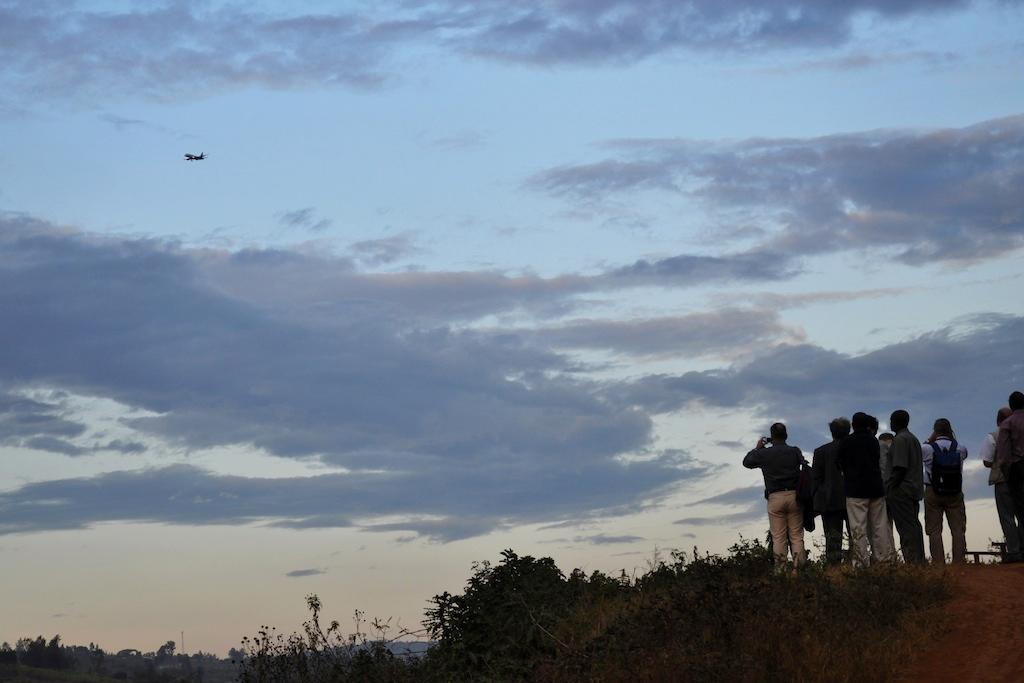Rwanda: Introduction to a complex nation
A group of people watch as a plane makes it’s final approach to the International airport in Kigali, Rwanda, on Sept. 16, 2010.
KIGALI, Rwanda — Muraho from Rwanda!
That’s Kinyarwandese for “Hello!”
I’m in Rwanda, on a trip sponsored by the International Reporting Project, to look at how this key African country is remaking itself 17 years after the horrific genocide.
Rwanda is one of Africa’s most inspiring success stories. Or it is one of the continent’s most worrying countries.
President Paul Kagame is a dedicated leader determined to transform Rwanda into a modern nation with a prosperous economy, good health care, education and job opportunities for all. Or Kagame is an iron-willed leader who is maintaining a steely grip on the country and who does not respect human rights.
More: Rwanda returns conflict minerals back to DRC
These are the dramatic contrasts of the beautifully hilly little country wedged between Eastern and Central Africa.
“Rwanda inspires people,” said Timothy Longman, director of Boston University’s Africa Studies Project.
“Many believe passionately that the country is doing incredibly well and that Kagame is a progressive and visionary leader. Others see the dark side — the repression, the intolerance of dissent, an appalling human rights record,” said Longman. “Both sides believe passionately in their narratives of the country. And both have good reasons for their points of view.”
Longman himself has worked in Rwanda and studied the country for years.
“Rwanda is great because it is really complex. There is always another layer to understand. There is something more behind what people are saying,” said Longman.
More: Rwanda News: Blood on Kagame's hands?
Right now I’m seeing the bright side of Rwanda.
As the plane landed I could the lights glittering from the many hills of Kigali. Officials were friendly and efficient at immigration and again at the hotel. The weather is warm and comfortable.
“Welcome to Rwanda! We are proud of our country and we want you to see it,” said Fred Mwasa, an irrepressible Rwandan journalist who is showing the International Reporting Project’s team of editors around Kigali. Mwasa, the managing editor of the Chronicles newspaper, proudly showed Kigali’s modern buildings and new roads, many of which have been built by the Chinese.
“Americans bring democracy, but the Chinese bring us things we need, like new roads and buildings,” quipped Mwasa. The Chinese have built a sports stadium and the new parliament building. Mwasa said they built them at very competitive prices and they hired lots of Rwandans for the jobs.
“We don’t know what language to speak in Rwanda,” said Mwasa, jokingly referring to the country’s dramatic switch a year ago to English as the official language, after years of being a French-speaking country.
“You’ll love it here,” said a Zimbabwean friend that I bumped into at the airport. “Now that you’ve come here, you’ll come again and again. It’s efficient and a great place to do business.”
But already I’ve heard a local resident refer to the “Stepford Wives” quality of Rwanda where everyone says what they think you should hear, but there is a different story behind the façade.
Over the next 13 days I will be looking into Rwanda’s politics, its economy, press, health and reconciliation issues. And I’ll be going into the wild to see Rwanda’s famous mountain gorillas. I’ll be blogging about all aspects of the trip to share what I learn.
“It’s a challenge to get beyond the veneer of Rwanda,” said Longman. Over the next two weeks that exactly what I intend to do.
Andrew Meldrum’s trip to Rwanda is sponsored by the International Reporting Project
